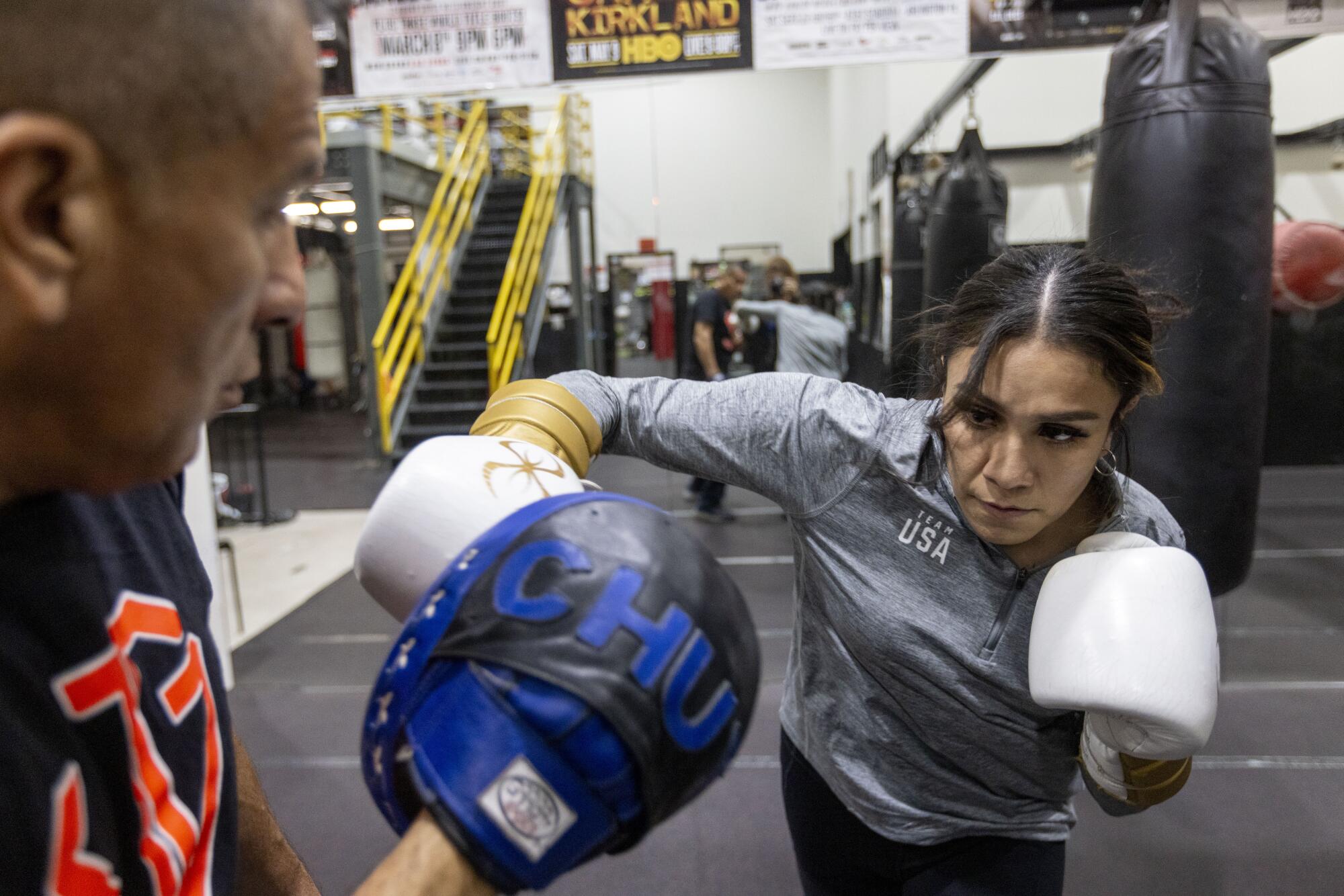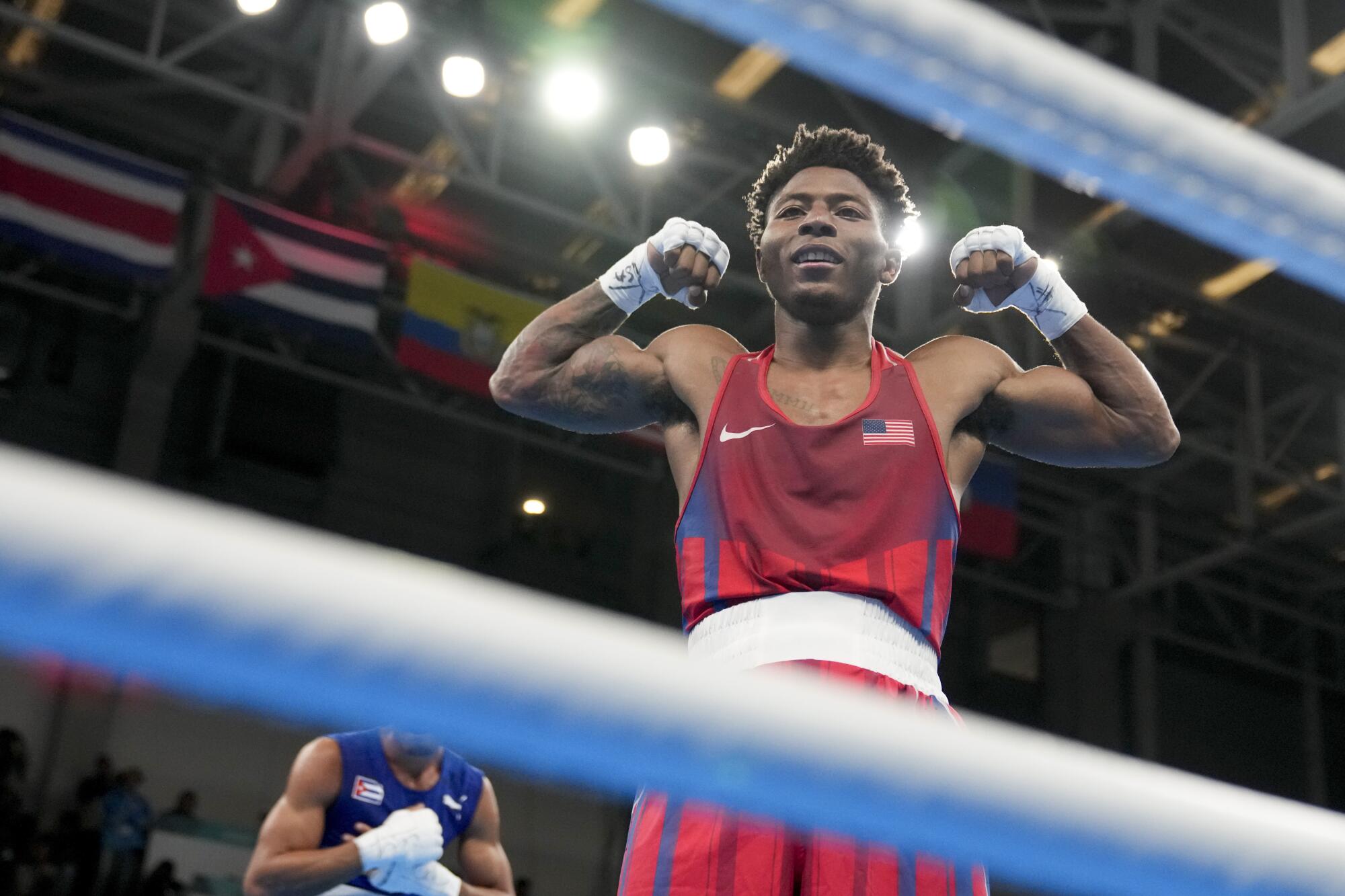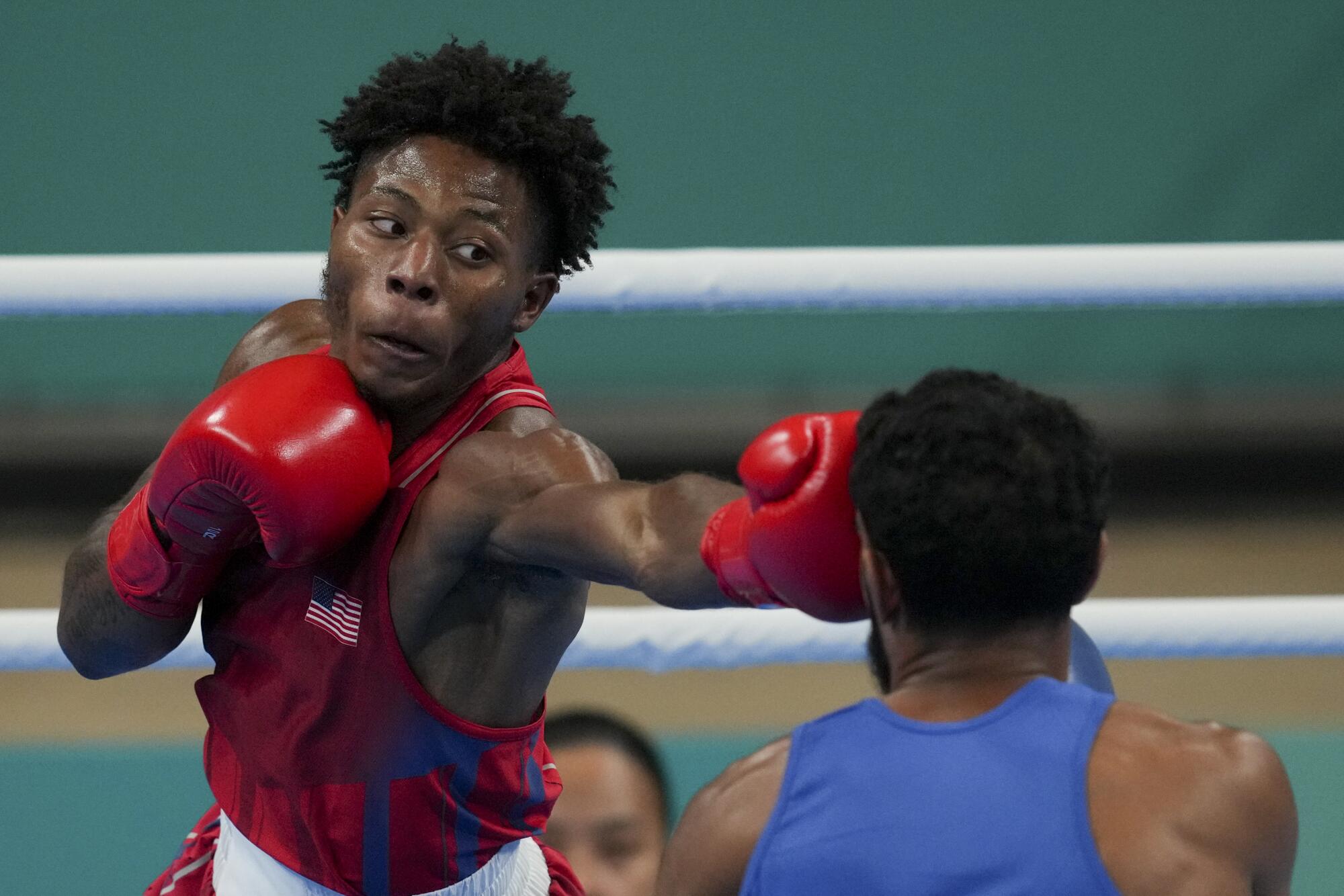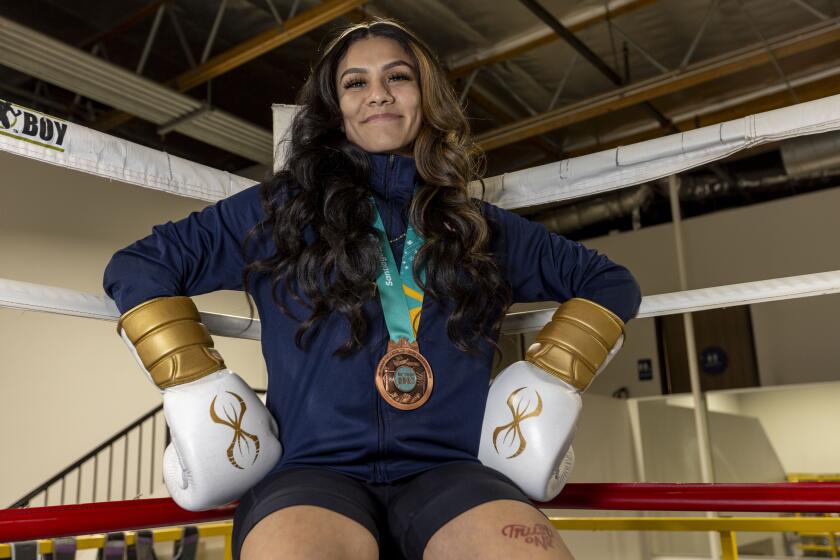
There was a time when the U.S. dominated Olympic boxing. In the three Summer Games the Americans took part in between 1976 and 1988, U.S. fighters made the podium in 26 of 35 divisions, winning 17 gold medals.
Among the boxers who won Olympic titles, then went on to win world championships as professionals, were Sugar Ray Leonard, Michael and Leon Spinks and Pernell Whitaker.
But lately? Not so much. The U.S. has won only 10 medals since 2004 — or one fewer than it won in 1984 alone. And Claressa Shields, a two-time women’s middleweight champion, is the only American to strike gold in that span.
That could change this summer. Although none of the eight boxers the U.S. is sending to Paris have fought in the Olympics, at least half are solid medal contenders. Their success will rest in large part on the draw to determine the bracket for each weight class, which is held the night before the first bout.
For women’s lightweight Jajaira Gonzalez and men’s featherweight Jahmal Harvey, it’s unlikely their paths through the brackets will be more challenging than the ones they took to get to Paris in the first place.
LA28 is planning to build a false floor 11 feet above the Coliseum field — covering the first 14 rows of seats — to create an official Olympic track.
For Gonzalez, a three-time world junior champion as a teenager, the Olympics offer an opportunity for redemption after a three-year career pause.
“I was blessed with a second chance that not a lot of people get,” the Glendora native said. “I feel like this was destined for me, like I was supposed to be here.”
Gonzalez was supposed to make her Olympic debut eight years ago in Rio. But she was upset by Mikaela Mayer in the U.S. trials, losing a split decision in the deciding bout and failing to make the team. That started a downward spiral in which Gonzalez began to skip training and saw her mental health deteriorate while she gained 35 pounds.
She hit rock bottom in the 2018 national championship where she lost her first fight. She wouldn’t box again for more than three years.
“It was a lot of mental stuff. I just needed a break,” Gonzalez said. “I used to be the type of person that used to think that mental stuff was, like, weak. Until it happened to me.”
Gonzalez dealt with anxiety attacks, so she started seeing a therapist and keeping a journal. Slowly she began to emerge from what she calls “a very dark time in my life.”
“I’ve grown so much mentally,” she said. “I feel like I’ve been through the worst already. Any little setback that I have now, it’s like I’ve learned from that and it’s easier for me to push it to the side and keep moving forward.
“Instead of staying in that dark hole where I’m just feeling sorry for myself, now I’m like ‘OK, this bad thing happened but how can I make it positive?’ Control what you can control, F what you can’t.”

That mindset helped push Gonzalez, 27, to a bronze medal at 60 kilograms (132 pounds) at last fall’s Pan American Games. She had started her comeback at 63.5 kilograms (140 pounds) but returned to her old weight after finishing ninth at the 2022 world championships as a super lightweight.
Gonzalez’s father, Jose, was a fighter in his native Mexico, although he didn’t push his children into the sport. But when his two eldest sons fell in love with boxing and asked their father to train them, he chose to make it a family affair, inviting Jajaira to tag along on the trips to the gym.
Now Gonzalez’s family will be following her to Paris, where she hopes to become the first American to medal in the women’s lightweight division. Just stepping into the ring, however, will qualify as a victory given what she has been through.
“I never thought I wouldn’t be boxing again. Boxing’s all I’ve known since I was 8 years old,” she said. “This is my life. This is what I love to do.
“Now that I think about it, now that I look back, I do feel like maybe I was too young. Now that I’m older, I’m more mature. Everything I went through, I feel like it kind of prepared me and I feel like this is my moment now.”
Harvey, who will compete at 57 kilograms (127 pounds) in Paris, was pushed into boxing by Daryl Davis, a former football coach who thought Harvey was too small for the gridiron but knew he was pretty good at fighting.
“He knew that I got into a lot of fights growing up,” Harvey said. “He and my parents grew up together in the same neighborhood, went to the same high school. So when I would get in trouble in school for fighting, he [knew].
“Once he started getting to coach in boxing, he wanted to transfer me over.”

That proved to be a pretty good decision since Harvey, who grew up just outside Washington, won his first national Junior Olympics title at 13. Five years later he became the first American male to win a title at the elite world championships since 2007, beating defending world champion Mirazizbek Mirzakhalilov of Uzbekistan in the second round before dispatching Olympians Samuel Kistohurry of France and Serik Temirzhanov of Kazakhstan.
He followed that with a gold medal in the Pan American Games last fall and now Harvey, 21, is considered by many to be the best amateur boxer in the U.S. He’s certainly the best hope to win a medal, although Olympic teammates Joshua Edwards (super heavyweight) and Roscoe Hill (flyweight) have both medaled in international competition and are good bets to make the podium in Paris.
One of the first things Davis taught Harvey when they began working together was that he was safer being punched in the ring than he was being hit on the football field. It wasn’t a lesson the youngster immediately appreciated.
“I didn’t think nothing of boxing. I was always football,” Harvey said.
Jajaira, de Glendora, se convirtió en la primera boxeadora estadounidense en clasificar este año a los Juegos Olímpicos de París 2024
But he weighed about 85 pounds when he entered high school, which caused him to reconsider.
“I just weighed my options,” he said. “I was like yeah, I really love football. But I’m a realistic person and I know that I can make it way further in boxing than I could in football.
“I just knew boxing would be my sport.”
Yet for all his success, Harvey said his path to Paris was paved with a three-bout losing streak that started six months after his world championship win.
“It was important for me to lose so that I could work on the aspects of my game that I lacked,” said Harvey, who is 59-7 in his career. “And it wasn’t really anything inside the ring. It was everything outside the ring. Being away from family, mentally that was draining. Training all the time.
“I got a better diet, and then I started recovering better so my body could perform.”
As Harvey grew, he began to cut weight for the first time. So he experimented with a vegetarian diet. but that left him with low energy. Eventually he added fish and found a combination that worked.
“I had to learn what foods to eat and how to get the right nutrition,” he said.

He also sought more balance between his life inside and outside the ring.
“It’s very important to not let [boxing] run your life,” he said. “I just let it be fun, let it come to me naturally. I put in a lot of work in the gym, so I know that OK, I can still go out, watch a movie, hang with friends.
“The gold medal, definitely that’s what I’m working to achieve. But I’m not stressing about the gold medal. I know it’s going to come to me if I put the work in. I’m just so proud of myself for even making it there.”
And if he becomes the second American male to win a boxing gold this century after Andre Ward earned one in 2004, would he follow Ward into the pro ring and cash in on all that work?
“If I win the gold medal, I might want to come back and become a two-time gold medalist,” he said.
That would be an even bigger achievement. The Americans haven’t had a man do that since 1904.
More to Read
Go beyond the scoreboard
Get the latest on L.A.'s teams in the daily Sports Report newsletter.
You may occasionally receive promotional content from the Los Angeles Times.










